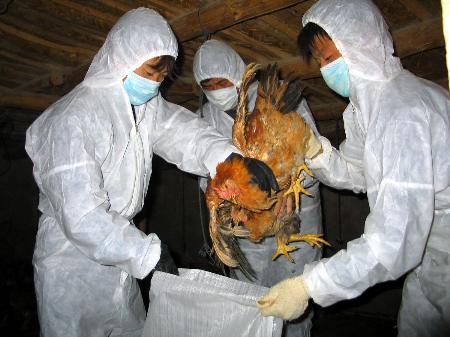Six people died in China since the outbreak of a new strain of bird flu and health experts there are scrambling to contain the spread of H7N9 virus.
How deadly is it?
The new strain of bird flu has killed six out of the 16 people diagnosed with H7N9 virus – mostly older adults and young children. Sufferers demonstrate flu-like symptoms such as fever, runny nose, and an itchy throat. So far none of those infected have spread the virus on to another human. And three of the most recent cases involved men, according to The Washington Post.
Bird flu victims include a 38-year-old from Zhejiang province, in eastern China, who became sick March 7; a 64-year-old, also from Zhejiang, who became ill March 28; and a 48-year-old from Shanghai who also became sick March 28.

Where did the virus originate?
Shanghai officials traced the new strain back to a pigeon sold at the Huhai agricultural market, which was closed Thursday. Now, Chinese health authorities are monitoring some 400 people who were in contact with the people infected. Officials are monitoring this group in case, by some chance, the virus does mutate to the point that it can be passed by humans – and also to more quickly diagnose any of the 400 people if they begin to exhibit symptoms.
What makes the virus so dangerous?
Its speed. “If a flock of chickens or ducks get H5N1, it will kill them and set off alarm bells,” John Oxford, a professor of virology at Queen Mary, University of London, Queen Mary, told the Times.
“But this virus seems to be a bit more tricky.” The influenza strain spreads quickly through large groups of birds, which often don’t display symptoms. As a result, the disease can be incredibly difficult to track.
“At this stage it’s still unlikely to become a pandemic,” Richard Webby, director of a WHO flu center at St Jude Children’s Research hospital in Memphis, Tennessee, told The Guardian.
“We should be concerned, there are no alarm bells ringing yet.”
What’s being done to stop it?
Health officials have already slaughtered more than 20,000 birds as a precautionary measure. Shanghai is closing all of its live poultry markets beginning Saturday, and US health authorities are working on a vaccine. The outbreak is rekindling memories of the SARS outbreak that began in China 10 years ago, which infected 8,000 people worldwide largely due to Beijing’s tendency to keep secrets. This time, however, Chinese health authorities have largely done a commendable job keeping the public on alert.
“It was the Ministry of Health and Family Planning that first came to us and volunteered the information,” said Gregory Hartl, a spokesman for the WHO in Geneva.
“Their response has been excellent.”
